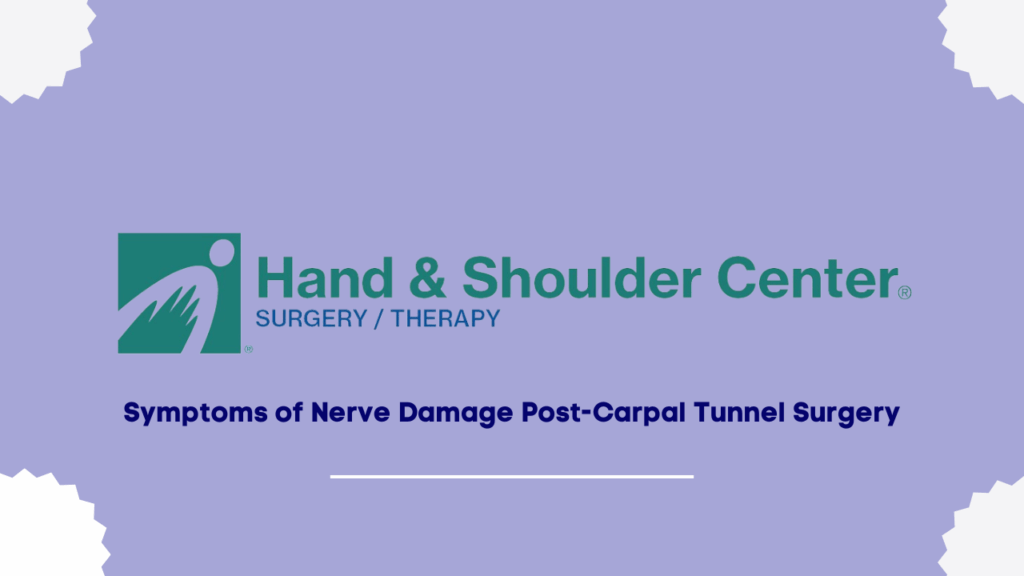Symptoms of Nerve Damage Post-Carpal Tunnel Surgery
Carpal tunnel surgery is often life-changing, helping patients find relief from persistent pain, tingling, and numbness caused by median nerve compression. But for some, new concerns may arise during recovery. A common question is: what are the symptoms of nerve damage after carpal tunnel surgery?
While most people heal without complications, recognizing the signs of nerve irritation or damage early can help ensure a smoother recovery and prevent long-term issues. In this article, we’ll explore symptoms to watch for, what thumb problems after carpal tunnel surgery might mean, how to manage post-surgical pain, and what to expect long-term.
1. Recognizing Nerve Damage Symptoms
During carpal tunnel release surgery, the transverse carpal ligament is cut to relieve pressure on the median nerve. Although rare, the nerve can sometimes be irritated or damaged in the process. Understanding the red flags is important.
Common symptoms of possible nerve damage after carpal tunnel surgery include:
- Persistent numbness or tingling in the thumb, index, or middle fingers that does not improve over time.
- Sharp, burning pain radiating into the hand or forearm.
- Increased sensitivity (even light touch feels painful, known as allodynia).
- Weakness or loss of grip strength, especially when holding objects.
- Clumsiness or difficulty with fine motor skills, such as buttoning clothes or typing.
While some of these sensations can occur as part of normal healing, persistent or worsening symptoms beyond the typical recovery window may point to nerve-related complications.
👉 Learn more about carpal tunnel syndrome and treatment options from our team.
2. Thumb Issues Post-Surgery
One of the most concerning problems for patients is thumb weakness or pain after carpal tunnel surgery. Because the median nerve directly affects thumb movement and sensation, ongoing thumb issues can signal irritation.
Potential thumb problems after carpal tunnel surgery include:
- Weakness in pinching or gripping objects (like turning a key or holding a pen).
- Loss of thumb sensation, leading to difficulty with fine touch.
- Pain at the base of the thumb, which may also relate to nearby tendon irritation.
It’s important to note that mild thumb discomfort is common early on, as swelling and nerve recovery take time. However, persistent or worsening thumb dysfunction could indicate nerve involvement that should be evaluated by a hand specialist.
3. Managing Post-Surgical Pain
Mild pain, swelling, and stiffness are expected parts of recovery. But if your discomfort feels different than standard healing pain, it may suggest nerve irritation.
Ways to manage pain after carpal tunnel surgery include:
- Rest and elevation: Keep your hand elevated in the days after surgery to reduce swelling.
- Cold compresses: Applying ice packs intermittently can ease pain and inflammation.
- Gentle stretching and therapy: Hand therapy exercises, guided by a specialist, promote safe mobility and reduce stiffness.
- Over-the-counter pain relievers: Medications like ibuprofen or acetaminophen may help in the short term.
- Nerve-specific medications: If nerve-related pain is suspected, doctors may prescribe medications such as gabapentin.
If pain continues to feel sharp, burning, or electric in nature, it is important to seek follow-up care. These are classic indicators of nerve pain rather than typical surgical soreness.
👉 For related guidance, explore our article on carpal tunnel treatment options.
4. Long-Term Outlook After Surgery
Most people recover fully from carpal tunnel surgery within a few months, experiencing improved hand function and reduced symptoms. But when nerve damage occurs, the recovery timeline can be longer and outcomes vary.
Factors that affect long-term outlook include:
- Extent of nerve damage: Mild irritation may resolve with time, while more severe injury can lead to lasting symptoms.
- Timing of surgery: Patients who had prolonged compression before surgery may experience slower or incomplete recovery.
- Rehabilitation and therapy: Consistent hand therapy improves function and reduces stiffness.
- Overall health: Conditions like diabetes can influence nerve healing.
If left untreated, nerve damage can impact hand function permanently. This is why follow-up with a hand specialist is essential if concerning symptoms persist.
When to Seek Medical Attention
It’s natural to experience some numbness, tingling, or soreness as nerves recover after surgery. But if you notice:
- Numbness that does not improve or worsens,
- Weakness in your thumb or grip strength,
- Burning or electric pain that disrupts daily life,
…it’s time to call your doctor. Early intervention offers the best chance for restoring full hand function.
Final Thoughts
Carpal tunnel surgery offers relief for countless patients every year. Still, understanding what are the symptoms of nerve damage after carpal tunnel surgery ensures you know when your recovery is on track—and when it’s time to seek additional care.
If you’re experiencing thumb problems after carpal tunnel surgery or have concerns about ongoing nerve-related symptoms, the specialists at the Hand & Shoulder Center are here to help. With expertise in advanced hand and wrist care, we’ll guide you toward the right treatment and support for long-term recovery.

